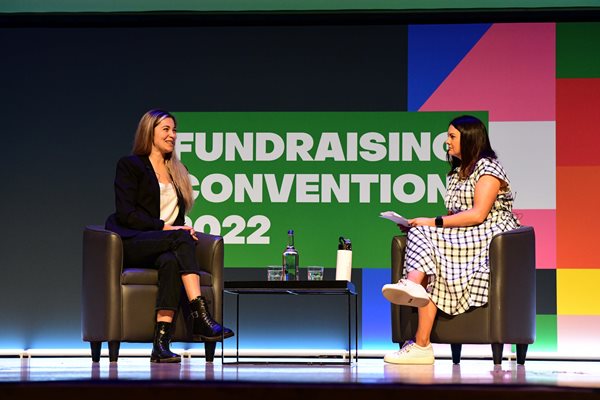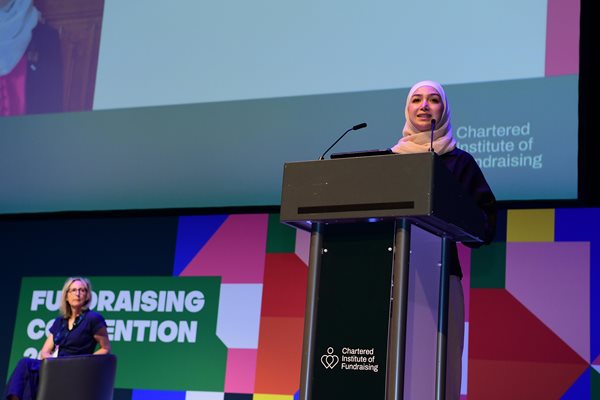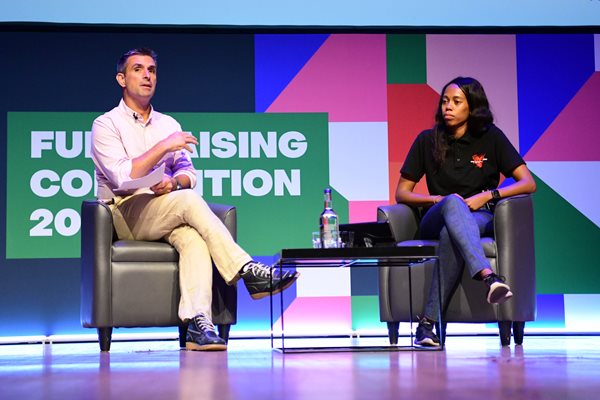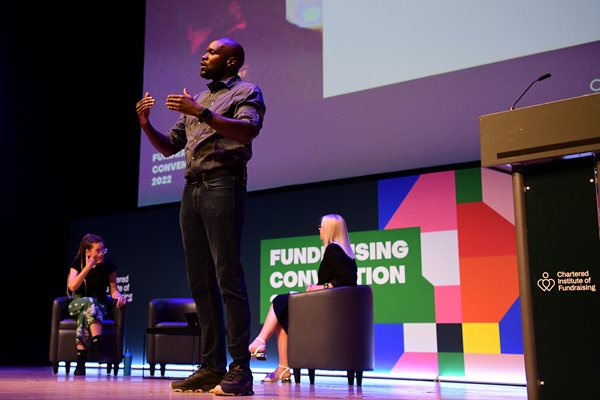Over the last three days, speakers at the event at London’s Barbican Centre encouraged attendees to dream big but also be vulnerable and humble, to take care of themselves and their colleagues, and to never, ever make assumptions.
Dr Julia Shaw – upgrade your workplace culture
Dr Julia Shaw is a German-Canadian psychologist, a memory hacker, an artificial intelligence scientist and champion of better workplace environments, working actively to solve problems relating to harassment and discrimination.
“I always thought I could change the world for the better. And why not? Who else is going to do it?”, Dr Shaw asked in the Convention’s opening plenary on Monday - a motivation that she said was shared by many in the room, remarking: “There is a real value in seeing something in the world that you want to make better and then trying to fix it. That is literally everyone in this room.”
In the session, Dr Shaw and CIOF chair Nadine Campbell discussed how workplaces and professional communities can deal with harassment and inappropriate behaviour, with the psychologist saying she was pleased that the institute had put this high on the agenda: “I have never been to an event where you have had someone like me on the main stage, and as the first speaker.”
Dr Shaw is the founder of the safeguarding reporting tool Talk to Spot, which has now been adopted by CIOF as its new mechanism for open-door reporting of inappropriate conduct. As well as discussing the tool, she spoke from her own experiences as an openly bisexual woman and feeling powerless in doing anything about it, a topic she has written about in her acclaimed, recently published book ‘Bi’. She told the Convention that by recognising mistakes, encouraging conversations and nurturing a positive culture of change, rather than adopting a defensive stance, organisations of all kinds can encourage greater diversity and inclusivity, and create happy, safe environments for all.

Maya Ghazal – using narrative to take flight
“I am a Syrian, a refugee and a woman. Many people might see this as an unfortunate combination but I am here to challenge every assumption you might have about me.”
After this bold opening, Maya Ghazal told her extraordinary story of coming to the UK as a child refugee, and becoming the first female Syrian refugee pilot, aged just 21.
Particularly striking in Maya’s story was her description of how, having arrived in the UK and attempting to enrol in a local school, she was refused entry. Local schools were unsure how to deal with her and the certificates she had from her Syrian education, leaving her alone and feeling lost, isolated and without purpose. This boredom, she said, was more frightening than anything she had experienced, even back home in Damascus with bombs raining down around her.
In a highly-emotive session, she told her story, reminding the audience not to label her or any other refugee or to tell her she can’t do something because she is a girl; to think about education as being just as important as food, water and safety for refugees; and to believe in refugees, saying: “We will reward you with our commitment and talent.”
Alongside Maya, Fiona Hesselden, UK Director of Fundraising at the UN Refugee Agency (UNHCR), described the agency’s work in helping Maya to become a UNHCR Ambassador and enabling her to share her story by lining her up for a TED Talk and arranging her slots as a motivational speaker across the UK. Fiona explained that UNHCR is increasingly using ‘real people’ with real experiences, rather than celebrities, as part of a deliberate storytelling strategy. It is a strategy that increasing numbers of charities are pursuing - and from Maya’s performance, it is clear why.

Simon Blake & Lorraine Lewis – Mental Wellbeing for Fundraisers
The subject of mental wellbeing for fundraisers was the theme of plenary discussion between Simon Blake, Chief Executive of Mental Health First Aid England (MHFA), and Lorraine Lewis, who six years ago co-founded and is now the CEO of The Lewis Foundation. The foundation provides gifts and support packages to adult cancer patients; Lorraine set up the charity having seen her mother-in-law hospitalised with cancer, and noticed that the atmosphere was markedly different to that created on children’s cancer wards.
Lorraine said that fundraisers, particularly those working for small charities, are liable to be asked to juggle many different tasks, over-stretch themselves and feel like there are not enough hours in the day. This can be particularly stressful when working in a traumatic or emotional area, such as cancer, she noted.
Simon said that a survey by MHFA last year found that people would rather talk to their managers about diarrhoea than about depression - a worrying fact in a turbulent time given the cost-of-living crisis, and society charities battling high-stakes issues like structural racism, women’s rights and abortion, and the Covid-19 pandemic.
Among the tips that came out of the session were:
- Asking fundraisers to think about the language they are using to promote their work. Be better with vocabulary; don’t say that something is a “mad” jump or a “crazy” challenge.
- Remembering that the brain needs to rest as much as any other part of the body. Help your brain by getting good sleep, exercising, drinking lots of water, switching off your devices. Your body and mind need to look after each other.
- Self-care is so important. Make ‘you’ time, set boundaries, remind yourself of what matters and make time for the hobbies you enjoy.
And don’t just say you’ll do it, but actually implement it.

Dwayne Fields, to infinity and...
In 2010, Dwayne Fields was the first young black Briton to walk 370 miles to reach the North Pole. Now, he told the Convention in the final plenary session, he is setting his sights on the South Pole.
Born in Jamaica, Dwayne came to the UK aged six, but has been the victim of both knife and gun crime. As a result of his experiences of the effects of gangs and crime, he decided to change his life. As well as becoming an adventurer, he is studying for a degree and is an ambassador for his university, the University of East London, and gives motivational talks to young people on his exploits and achievements.
The young explorer told attendees that storytelling was most effective when the people telling stories were honest, mindful of their weaknesses and open to making a connection with their audience.
Dwayne also spoke of his admiration for fundraisers and used the session to thank attendees for what they do to keep charities running. “What you guys do is really tough,” he told the Convention. Attendees were left reflecting that while their role might not be as tough as trekking to the North Pole, it could be equally rewarding.

The Chartered Institute is very grateful to (and inspired by!) all those who participated in plenary sessions and all sessions throughout the Convention. Content from many of these will be made available online later in the year as part of the upcoming Festival of Fundraising – more details to come soon!